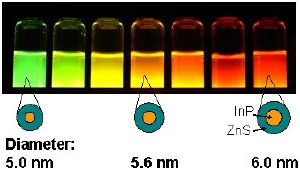Mar 25 2009
Norio Murase and his colleagues of the Nano-structured Photonic Device Group, the Photonics Research Institute, the National Institute of Advanced Industrial Science and Technology (AIST), have developed indium phosphide (InP) photoluminescent NCs. These NCs are dispersible in water and stable for a long period and they exhibit high PL efficiency (68% in case of red).
 PL of the developed water-dispersible NCs under UV irradiation. The PL color changes in accordance with the particle size of the InP (core).
PL of the developed water-dispersible NCs under UV irradiation. The PL color changes in accordance with the particle size of the InP (core).
The NCs have an InP/zinc sulfide (ZnS) core-shell structure, where InP is the core and ZnS is the coating on the outside. By controlling the reaction conditions, the ZnS shell was thickened and improved PL efficiency and chemical stability were achieved. At the same time, sulfur-containing surfactant was bound on the NC surface to increase water dispersibility, which was essential for biological applications.
Conventionally, cadmium selenide (CdSe) with ZnS shell, cadmium telluride (CdTe) with cadmium sulfide (CdS) shell, etc., have been used as photoluminescent NCs for the in vivo observation of quantity, distribution, and movement of trace substances such as in cultured cells. Although these NCs can be dispersed in water, their range of application is limited because cadmium causes cell death.
The developed NCs are expected to be used in wider applications when compared to the conventional cadmium-containing NCs.
This technique will be demonstrated in “nano tech 2009” to be held at Tokyo Big Sight from February 18 to 20, 2009.